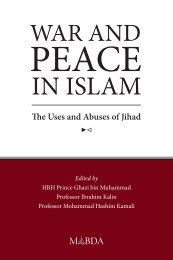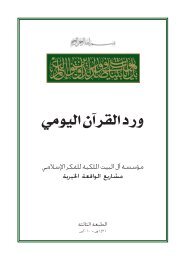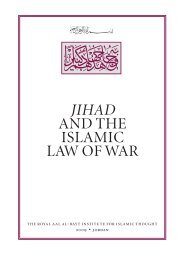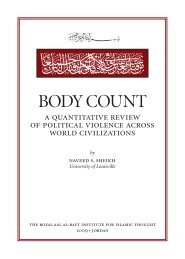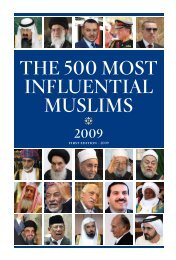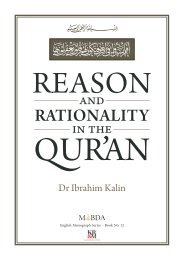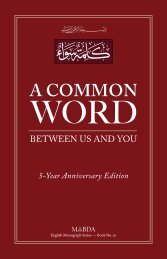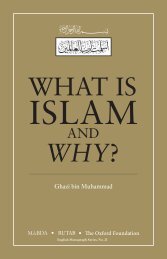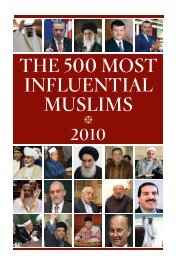- Page 1:
Al-W¥^idÏ’s Asb¥b al-Nuz‰l
- Page 4 and 5:
First published in 2008 by Fons Vit
- Page 6 and 7:
Asbab al-Nuzul Surah 41: Fussilat 1
- Page 8 and 9:
Series Editor’s Foreword The Grea
- Page 10 and 11:
Asbab al-Nuzul left open and even a
- Page 12 and 13:
Asbab al-Nuzul more expert in Hadit
- Page 14 and 15:
Asbab al-Nuzul in the form of didac
- Page 16 and 17:
Asbab al-Nuzul to discover that al-
- Page 18 and 19:
In the name of Allah, the Beneficen
- Page 20 and 21:
Author’s Introductio Al-Sharif Is
- Page 22 and 23:
Author’s Introductio him and give
- Page 24 and 25:
Chapter 2: Surah al-Baqarah This Su
- Page 26 and 27:
Chapter 2: Surah al-Baqarah (Lo! Th
- Page 28 and 29:
Chapter 2: Surah al-Baqarah ibn al-
- Page 30 and 31:
Chapter 2: Surah al-Baqarah exalted
- Page 32 and 33:
Chapter 2: Surah al-Baqarah Qatadah
- Page 34 and 35:
Chapter 2: Surah al-Baqarah (Those
- Page 36 and 37:
Chapter 2: Surah al-Baqarah (Lo! (t
- Page 38 and 39:
Chapter 2: Surah al-Baqarah every w
- Page 40 and 41:
Chapter 2: Surah al-Baqarah The com
- Page 42 and 43:
Chapter 2: Surah al-Baqarah Ibn Shi
- Page 44 and 45:
Chapter 2: Surah al-Baqarah Upon th
- Page 46 and 47:
Chapter 2: Surah al-Baqarah four go
- Page 48 and 49:
is vile and his blood money is vile
- Page 50 and 51:
Chapter 2: Surah al-Baqarah when th
- Page 52 and 53:
Chapter 2: Surah al-Baqarah Said Sa
- Page 54 and 55:
Chapter 2: Surah al-Baqarah alted i
- Page 56 and 57:
Chapter 2: Surah al-Baqarah to my L
- Page 58 and 59:
Chapter 2: Surah al-Baqarah the Day
- Page 60 and 61:
Chapter 2: Surah al-Baqarah The com
- Page 62 and 63:
Chapter 3: Surah Al ‘Imran They s
- Page 64 and 65:
Chapter 3: Surah Al ‘Imran you wi
- Page 66 and 67:
Chapter 3: Surah Al ‘Imran summon
- Page 68 and 69:
Chapter 3: Surah Al ‘Imran (A par
- Page 70 and 71:
Chapter 3: Surah Al ‘Imran And ac
- Page 72 and 73:
Chapter 3: Surah Al ‘Imran Said Z
- Page 74 and 75:
Chapter 3: Surah Al ‘Imran bourho
- Page 76 and 77: Chapter 3: Surah Al ‘Imran (Faint
- Page 78 and 79: Chapter 3: Surah Al ‘Imran his fa
- Page 80 and 81: Chapter 3: Surah Al ‘Imran him, s
- Page 82 and 83: Chapter 3: Surah Al ‘Imran (Think
- Page 84 and 85: Chapter 3: Surah Al ‘Imran (O ye
- Page 86 and 87: Chapter 4: Surah al-Nisa’ (Unto t
- Page 88 and 89: Chapter 4: Surah al-Nisa’ possess
- Page 90 and 91: Chapter 4: Surah al-Nisa’ Said Mu
- Page 92 and 93: Chapter 4: Surah al-Nisa’ in idol
- Page 94 and 95: Chapter 4: Surah al-Nisa’ those w
- Page 96 and 97: Chapter 4: Surah al-Nisa’ (Whoso
- Page 98 and 99: Chapter 4: Surah al-Nisa’ (It is
- Page 100 and 101: Chapter 4: Surah al-Nisa’ not bel
- Page 102 and 103: Chapter 4: Surah al-Nisa’ so he w
- Page 104 and 105: Chapter 4: Surah al-Nisa’ Said
- Page 106 and 107: Chapter 4: Surah al-Nisa’ (But Al
- Page 108 and 109: Chapter 5: Surah al-Ma’idah the d
- Page 110 and 111: Chapter 5: Surah al-Ma’idah (The
- Page 112 and 113: Chapter 5: Surah al-Ma’idah in ex
- Page 114 and 115: Chapter 5: Surah al-Ma’idah (O Me
- Page 116 and 117: Chapter 5: Surah al-Ma’idah this
- Page 118 and 119: Chapter 5: Surah al-Ma’idah Abu
- Page 120 and 121: Chapter 6: Surah al-An‘am In the
- Page 122 and 123: Chapter 6: Surah al-An‘am his fat
- Page 124 and 125: Chapter 6: Surah al-An‘am (… an
- Page 128 and 129: Chapter 7: Surah al-A‘raf Ibn ‘
- Page 130 and 131: Chapter 8: Surah al-Anfal In the na
- Page 132 and 133: Chapter 8: Surah al-Anfal (O ye who
- Page 134 and 135: Chapter 8: Surah al-Anfal them’.
- Page 136 and 137: Chapter 9: Surah al-Tawbah (And if
- Page 138 and 139: Chapter 9: Surah al-Anfal that it w
- Page 140 and 141: Chapter 9: Surah al-Anfal plied to
- Page 142 and 143: Chapter 9: Surah al-Anfal surprise.
- Page 144 and 145: Chapter 9: Surah al-Anfal ‘Ubayd
- Page 146 and 147: Chapter 9: Surah al-Anfal (And as f
- Page 148 and 149: Chapter 9: Surah al-Anfal Abraham p
- Page 150 and 151: Chapter 11: Surah Hud In the name o
- Page 152 and 153: Chapter 12: Surah Yusuf In the name
- Page 154 and 155: Chapter 13: Surah al-Ra‘d (… wh
- Page 156 and 157: Chapter 15: Surah al-Hijr (We have
- Page 158 and 159: Chapter 16: Surah al-Nahl (And thos
- Page 160 and 161: Chapter 16: Surah al-Nahl dina, the
- Page 162 and 163: Chapter 16: Surah al-Nahl thought t
- Page 164 and 165: Chapter 17: Surah al-Isra’ glorio
- Page 166 and 167: Chapter 17: Surah al-Isra’ lost l
- Page 168 and 169: Chapter 17: Surah al-Isra’ ‘A
- Page 170 and 171: Chapter 18: Surah al-Kahf (Say: Tho
- Page 172 and 173: Chapter 19: Surah Maryam will be ab
- Page 174 and 175: Chapter 21: Surah al-Anbiya’ In t
- Page 176 and 177:
Chapter 22: Surah al-Hajj of conten
- Page 178 and 179:
Chapter 23: Surah al-Mu’minun In
- Page 180 and 181:
Chapter 24: Surah al-Nur In the nam
- Page 182 and 183:
Chapter 24: Surah al-Nur set off fo
- Page 184 and 185:
Chapter 24: Surah al-Nur of his tie
- Page 186 and 187:
Chapter 24: Surah al-Nur The commen
- Page 188 and 189:
Chapter 24: Surah al-Nur mothers or
- Page 190 and 191:
Chapter 25: Surah al-Furqan Abi Mu
- Page 192 and 193:
Chapter 28: Surah al-Qasas In the n
- Page 194 and 195:
Chapter 29: Surah al-‘Ankabut In
- Page 196 and 197:
Chapter 30: Surah al-Rum In the nam
- Page 198 and 199:
Chapter 31: Surah Luqman him peace,
- Page 200 and 201:
Chapter 33: Surah al-Ahzab In the n
- Page 202 and 203:
Chapter 33: Surah al-Ahzab Abu Sa
- Page 204 and 205:
Chapter 33: Surah al-Ahzab remained
- Page 206 and 207:
Chapter 33: Surah al-Ahzab The proo
- Page 208 and 209:
Chapter 38: Surah Sad In the name o
- Page 210 and 211:
Chapter 39: Surah al-Zumar (Say: O
- Page 212 and 213:
Chapter 41: Surah Fussilat In the n
- Page 214 and 215:
Chapter 43: Surah al-Zukhruf In the
- Page 216 and 217:
Chapter 45: Surah al-Jathiyah In th
- Page 218 and 219:
Chapter 48: Surah al-Fath In the na
- Page 220 and 221:
Chapter 49: Surah al-Hujurat In the
- Page 222 and 223:
Chapter 49: Surah al-Hujurat His cr
- Page 224 and 225:
Chapter 49: Surah al-Hujurat scared
- Page 226 and 227:
Chapter 49: Surah al-Hujurat (O man
- Page 228 and 229:
Chapter 50: Surah Qaf In the name o
- Page 230 and 231:
Chapter 53: Surah al-Najm and say t
- Page 232 and 233:
Chapter 54: Surah al-Qamar He, reve
- Page 234 and 235:
Chapter 56: Surah al-Waqi‘ah Alla
- Page 236 and 237:
Chapter 58: Surah al-Mujadilah In t
- Page 238 and 239:
Chapter 58: Surah al-Mujadilah said
- Page 240 and 241:
Chapter 59: Surah al-Hashr In the n
- Page 242 and 243:
Chapter 59: Surah al-Hashr Hazim> A
- Page 244 and 245:
Chapter 60: Surah al-Mumtahanah we
- Page 246 and 247:
Chapter 61: Surah al-Saff In the na
- Page 248 and 249:
Chapter 63: Surah al-Munafiqun In t
- Page 250 and 251:
Chapter 63: Surah al-Munafiqun of A
- Page 252 and 253:
Chapter 65: Surah al-Talaq In the n
- Page 254 and 255:
Chapter 66: Surah al-Tahrim In the
- Page 256 and 257:
Chapter 67: Surah al-Mulk In the na
- Page 258 and 259:
Chapter 69: Surah al-Haqqah In the
- Page 260 and 261:
Chapter 74: Surah al-Muddaththir In
- Page 262 and 263:
Chapter 76: Surah al-Insan In the n
- Page 264 and 265:
Chapter 81: Surah al-Takwir In the
- Page 266 and 267:
Chapter 86: Surah al-Tariq In the n
- Page 268 and 269:
Chapter 92: Surah al-Layl him and g
- Page 270 and 271:
Chapter 93: Surah al-Duha (Did He n
- Page 272 and 273:
Chapter 97: Surah al-Qadr In the na
- Page 274 and 275:
Chapter 100: Surah al-‘Adiyat In
- Page 276 and 277:
Chapter 105: Surah al-Fil In the na
- Page 278 and 279:
Chapter 107: Surah al-Ma‘un In th
- Page 280 and 281:
Chapter 109: Surah al-Kafirun In th
- Page 282 and 283:
Chapter 111: Surah Tabbat In the na
- Page 284 and 285:
Chapters 113 & 114: Surah al-Falaq



